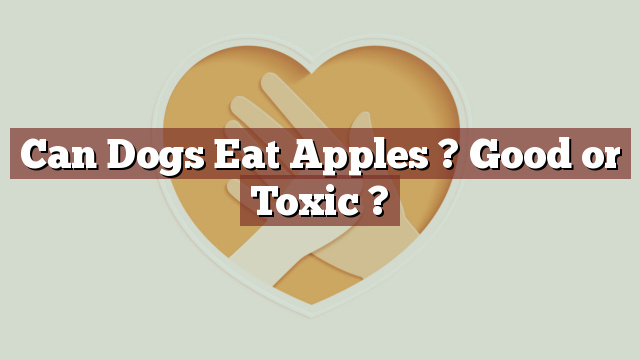Can Dogs Eat Apples? Good or Toxic?
Knowing which foods are safe for our dogs to eat is essential for their health and well-being. One common fruit that many dog owners wonder about is apples. Are they safe for our furry friends to consume, or should they be avoided? In this article, we will explore the nutritional value of apples, discuss whether dogs can eat them, highlight any potential risks and benefits, and provide safety measures to follow if your dog consumes apples.
Nutritional Value of Apples: What Do They Contain?
Apples are not only a delicious and refreshing snack for humans, but they also offer several nutritional benefits. They are rich in dietary fiber, which aids in digestion and helps maintain a healthy weight. Apples also contain essential vitamins such as vitamin C, vitamin A, and vitamin E, which contribute to a strong immune system and promote overall health. Additionally, they are a good source of antioxidants, which can protect cells from damage caused by harmful free radicals.
Can Dogs Eat Apples? Are They Safe or Toxic?
Can dogs eat apples? Yes, dogs can safely consume apples. Apples are non-toxic to dogs and can be a healthy addition to their diet when given in moderation. However, it is important to note that only the flesh of the apple should be fed to dogs. The seeds, core, and stem of the apple should be removed as they contain trace amounts of cyanide, which can be harmful to dogs if ingested in large quantities.
Scientific research and veterinary experts confirm that apples are safe for dogs to eat. However, it is crucial to introduce apples gradually into your dog’s diet and monitor for any adverse reactions. Some dogs may have sensitivities or allergies to certain fruits, including apples. It is always recommended to consult with your veterinarian before introducing any new food to your dog.
Potential Risks and Benefits: Should Dogs Consume Apples?
While apples are generally safe for dogs to eat, they should be given in moderation. Apples can provide several health benefits to our canine companions. The high fiber content in apples can aid in digestion and promote a healthy gastrointestinal system. The vitamins found in apples can support a strong immune system, improve skin and coat health, and contribute to overall vitality.
However, it is important to be aware of the potential risks associated with feeding apples to dogs. Feeding them large amounts of apples or allowing them to consume the seeds, core, or stem can lead to digestive discomfort and potentially harmful cyanide poisoning. It is crucial to remove these parts before offering apples to your dog.
What to Do If Your Dog Eats Apples: Safety Measures
If your dog accidentally consumes apples, including the seeds, core, or stem, it is important to monitor them for any signs of distress. If you notice any unusual symptoms such as vomiting, diarrhea, or abdominal pain, contact your veterinarian immediately. Additionally, if your dog has a known sensitivity or allergy to apples, it is advisable to avoid feeding them this fruit altogether.
To ensure the safety of your dog, always wash apples thoroughly before feeding them to remove any potential pesticides or toxins. Cut the apple into small, bite-sized pieces to prevent choking hazards, especially for smaller breeds. By taking these safety measures, you can enjoy the benefits of feeding apples to your dog while minimizing any potential risks.
Conclusion: Apples in Moderation Can Offer Health Benefits
In conclusion, dogs can eat apples as long as they are given in moderation and prepared correctly. Apples provide valuable nutrients such as fiber, vitamins, and antioxidants that contribute to a dog’s overall health. Remember to remove the seeds, core, and stem before offering apples to your furry friend to prevent any potential risks.
As responsible dog owners, it is crucial to be aware of safe and healthy food options for our pets. While apples can be a nutritious addition to their diet, it is always advisable to consult with your veterinarian before introducing any new food. By ensuring your dog’s safety and well-being, you can enjoy the benefits of sharing your favorite fruit with your four-legged companion.
Thank you for investing your time in exploring [page_title] on Can-Eat.org. Our goal is to provide readers like you with thorough and reliable information about various dietary topics. Each article, including [page_title], stems from diligent research and a passion for understanding the nuances of our food choices. We believe that knowledge is a vital step towards making informed and healthy decisions. However, while "[page_title]" sheds light on its specific topic, it's crucial to remember that everyone's body reacts differently to foods and dietary changes. What might be beneficial for one person could have different effects on another. Before you consider integrating suggestions or insights from "[page_title]" into your diet, it's always wise to consult with a nutritionist or healthcare professional. Their specialized knowledge ensures that you're making choices best suited to your individual health needs. As you navigate [page_title], be mindful of potential allergies, intolerances, or unique dietary requirements you may have. No singular article can capture the vast diversity of human health, and individualized guidance is invaluable. The content provided in [page_title] serves as a general guide. It is not, by any means, a substitute for personalized medical or nutritional advice. Your health should always be the top priority, and professional guidance is the best path forward. In your journey towards a balanced and nutritious lifestyle, we hope that [page_title] serves as a helpful stepping stone. Remember, informed decisions lead to healthier outcomes. Thank you for trusting Can-Eat.org. Continue exploring, learning, and prioritizing your health. Cheers to a well-informed and healthier future!

